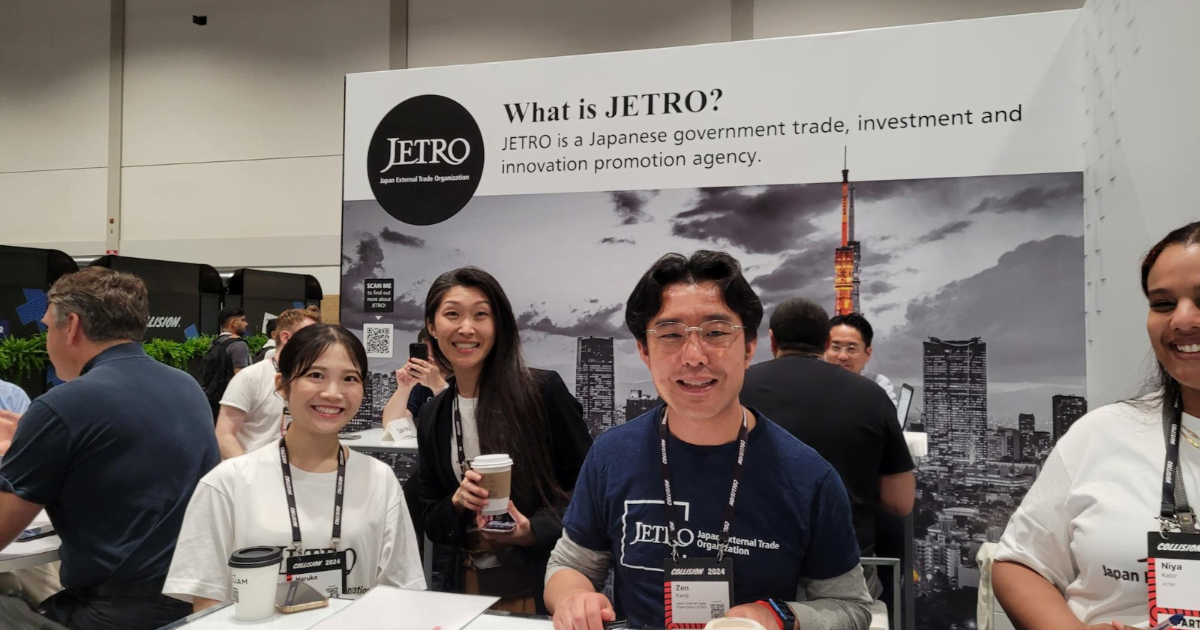Toronto is a very international city, recognized by both the United Nations and the BBC as the most diverse city in the world. Consequently, it is no surprise that Collision, a tech conference held annually in Toronto, garners international attention including from Japan. For Collision 2024, JETRO’s Global Acceleration Hub (GAH), in collaboration with DMZ, a startup incubator sponsored by Toronto Metropolitan University and the city of Yokohama, sponsored several Japanese startups to participate at the conference.
In addition to being a great experience for these small businesses to network and make connections, it was also an opportunity for these startups to put themselves on a global stage through events. In this article, we will go over two of the major events targeted towards Japanese startups at the event, as well as some of the interviews that were held with some of the standout startups and comments from JETRO about the event.
DMZ x JETRO: Japanese Startup Showcase
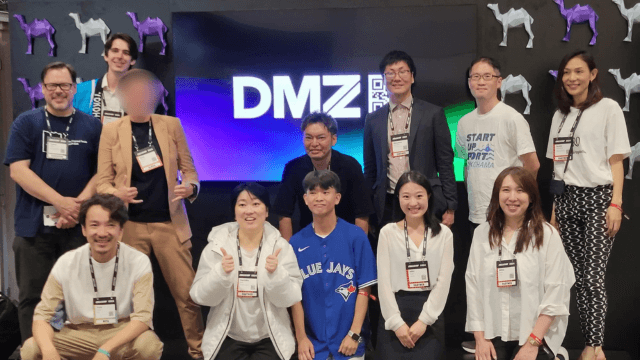
On the third day of the conference, June 19th, JETRO and DMZ sponsored a Japanese startup showcase. Ten companies participated in the event, introducing their companies to a global audience of investors and potential collaborators. Three of the startups were also sponsored by the city of Yokohama, showcasing the city’s goal of fostering local talent when compared to its larger neighbour of Tokyo.
Although the showcase was not on one of the main stages, it was quite crowded and saw significant attendance from both casual passersby and people interested in the Japanese market. The startups came from a variety of industries, including clothing, sports equipment, AI assistants and house rentals.
JETRO Pitch Competition
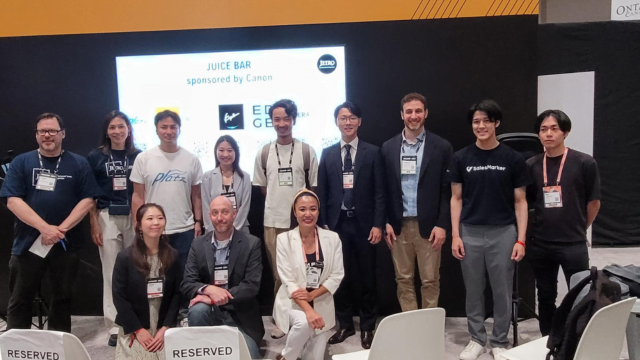
A staple of business conferences in North America is the timed pitch competition, where startups pitch their company to a panel of judges and an audience of investors and casual onlookers. Through a variety of criteria, judges evaluate each startup to determine which pitch was the best.
While the ideas are important in these competitions, equally important is the ability to eloquently deliver a message. These pitch competitions serve as scenario training for when entrepreneurs have to present their ideas to potential investors, secure funding, or attract strategic partnerships in real-world business environments. Of course, a competition such as this will likely be difficult for non-native English speakers, including Japanese people.
On the final day of Collision, June 20th, JETRO held a pitch competition, in collaboration with the city of Brampton and Canon Canada, whose head office is based in Brampton. The judges of the competition were Brampton regional councilor Rowena Santos, Jim Vail from Canon Canada and Shiori Nagase, also from Canon Canada. Seven companies, participated in the competition, most of which had also participated in the startup showcase the previous day. As a result, similar themes came up, including sports equipment, AI assistants and house rentals.
Related post : Unveiling Innovation: Understanding the Hottest Business Trends at Collision 2024
Comments from JETRO regarding the event
“In North America, large scale exhibitions are held in the US, but Collision, the largest tech conference, is held in Canada. This year we wanted to focus on supporting open innovation by Japanese companies with Canadian startups.”
“Specifically, study sessions were held on the Canadian AI ecosystem for open innovation personnel stationed in Japan, Silicon Valley, and other locations, and tours were organized to introduce collaboration programs with ecosystem personnel and companies in Toronto. Additionally, for Japanese companies looking to collaborate with Canadian startups, JETRO held matching sessions for individual business meetings with Canadian companies at the JETRO booth.”
“The Toronto office, which is one of the bases for JETRO’s Global Acceleration Hub (GAH) program, has a business partnership with DMZ, a long-established Canadian incubator. Some startups made the most of their opportunity to come to Canada by arriving in Toronto one week before Collision to attend sessions with DMZ mentors and be matched with Canadian companies and investors.”
“Although it is still too early to measure the results of the matching, we have received positive responses from the participating companies. We would like to keep a close eye on the progress to see whether it will end as a one-time matchmaking meeting or lead to future collaboration through continued discussions. “
Interviews
Kepler: Inoue Yuta (井上裕太)
Kepler is a hardware developer that focuses on developing monitors and display sensors that focus on the visual texture and depth of images. Yuta Inoue, the COO and CFO of Kepler presented Kepler’s display hardware at both the startup showcase and the pitch competition, ultimately claiming victory in the pitch competition.
“I think the uniqueness of our concept helped us win the competition,” Inoue explained.
“I think the judges wanted to see uniqueness from Japanese startups.”
Inoue continued by explaining how he feels that his company is tackling a real problem that is impacting people in their daily lives.
“About 50 percent of US residents spend most of their day staring at computer screens,” Inoue explained.
“Most display and monitor developers want to focus on fidelity and brightness. But that is not the future. We wanted to have an alternative.”
Inoue then discussed some of the technology and how it uses lighting materials and artificial light to mimic the textures of various objects such as paper and wood. Inoue explained that their technology can mimic the textures of various objects with 90 percent accuracy. Moreover, they have done studies that show that the technology creates less strain on the eyes and brain when compared to other displays.
The two things that Inoue is interested in exploring in the near future are improving the lighting algorithm and using the technology in art exhibitions.
“Since the NFT boom, digital art is experiencing a resurgence,” he explained.
“Once ready, we are looking to use our power to display digital art in Japan.”
Uzabase Edge: Gregory Hatchenberg
Although many Japanese already know Uzabase, the company is not as well known in the North American region, and thus used JETRO to promote SPEEDA EDGE, its AI-based research platform that helps with decision making. A marketing representative, Gregory Hatchenberg, appeared at both the startup showcase and the pitch competition to show off SPEEDA EDGE.
An interesting fact I learned from Hatchenberg is that the program was originally designed to solve internal decision making problems.
“We found that internally, we were struggling with making decisions,” Hatchenberg explained.
“We would oftentimes struggle with figuring out the difference between what was hype and what was real. There was just too much data.”
The solution was the creation of SPEEDA EDGE, the AI-based research platform that analyzes business intelligence and streamlines decisions.
“We wanted a way to make decisions, and we wanted a way to validate decisions and show related parties why we were making the decisions.”
Once they realized that the program was not only effective, but easily scalable, Uzabase realized that SPEEDA EDGE could be sold to a variety of companies, including North American ones.
“We believe that SPEEDA EDGE can be a disruptive technology, particularly for the North American market,” Hatchenberg explained.
Website: https://sp-edge.com/
Algoritmi: Satohiko Narumi(成海 里比古), Ryutaro Suda (須田隆太朗)
Algoritmi is a company that focuses on providing smart hostels and places of living through AI and IT. The company presented during both the showcase and the pitch competition. I was able to speak with all three members of the team at Collision, including CEO and senior advisor Satohiko Narumi , CTO and COO Ryutaro Suda.
“We developed our company around the concept of a family kitchen,” said Satohiko Narumi.
“Our slogan is 美味しいパンとコーヒー. These things are often in the home, and we wanted to express that through our company. We wanted it to feel like in the old days when people would meet, sitting at a fire pit.”
Currently Algoritmi is operating in the city of Takayama with one location and two more on the way. Built out of a traditional ryokan, the smart hostel has replaced maintenance tasks, such as security and cleaning with technologies such as cameras to inspect the kitchen, and facial recognition for security.
“Cleanliness and security were the two key issues we needed to tackle,” explained Ryutaro Suda.
“Therefore the smart hostel system is designed to ensure that even with minimal staff there are enough people around to help.”
A spokesperson for the company and content creator said they were very much intrigued by the concept. Together with Suda, they united around the idea of targeting the rising audience of digital nomads
“With the new visa, there will be plenty of digital nomads coming to Japan,” Grosser explained.
“With Algoritmi, we want digital nomads to find quick housing and the right community.”
Although the company is only based in Takayama, with all three hostel locations located there, Suda is confident that it will be able to expand.
“Because digital nomads can work from anywhere, we hope to provide a service that can operate from anywhere.”
Website URL: https://www.algoritmi.care/
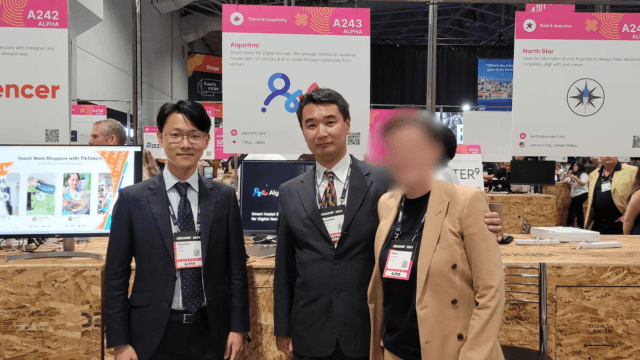
Ikigai: Miki Fujito (藤戸美妃)
Ikigai is a company in the health and living industry that focuses on alleviating loneliness. The company creates AI chatbots to alleviate the loneliness of seniors. The owner and founder of the company Miki Fujito participated at both the showcase and the pitch competition.
Fujito, a 6th year medical student at the University of Debrecen in Hungary, explained that the creation of Ikigai was inspired by her grandmother.
“My family is from a small town in Ehime, although they all live in Osaka now,” she began.
“My grandfather passed away a few years ago, and I mostly live in Hungary now. Thus, I only have a limited time to talk to my grandmother.”
Fujito thinks that the loneliness among Japanese elders has been increasing since the pandemic.
“The pandemic hit seniors the worst in Japan,” she continued.
“There is generally a lot of isolation in Japan and it’s only gotten worse for seniors since the pandemic.”
Fujito is therefore focusing on Ikigai alleviating that loneliness and developing AI companions that mimic the interactions of humans through reminiscence therapy.
“We want to make sure that the AI feels more personalized and more familiar to seniors,” she explained.
Right now, she is still working on developing the prototype, but Fujito hopes to roll out the software to a variety of different places.
“We are using the opportunity right now to test the prototype. We have plans to use the software in nursing homes.”
Conclusion
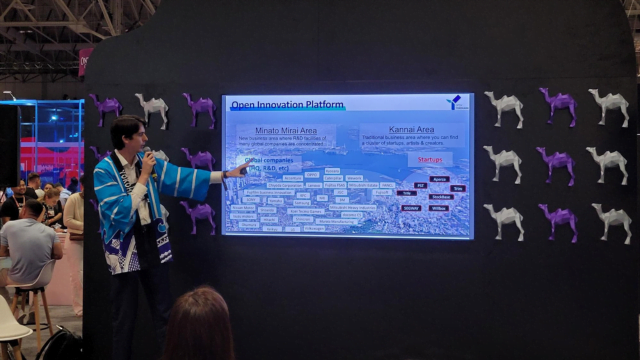
Next year, Collision will be relocating from Toronto to Vancouver, renaming itself WebSummit Vancouver. Although this will likely be a smaller conference – Toronto is the largest city in Canada – it may be better for companies based in East Asia and Japan. The city is located on the West Coast, making it closer to East Asia, and has the largest proportionate population of East Asians, including Japanese, in North America.
A spokesperson from JETRO commenting on the change stated:
“Vancouver has a smaller economy than Toronto, and there are limitations to the capacity of accommodation and the venue itself, so Websummit Vancouver is expected to be a more compact conference than Collision. On the other hand, it is easier to access from Japan and Silicon Valley than Toronto, so it will be easier for Japanese startups and Japanese companies on the West Coast to participate. JETRO is still considering what form it will take to exhibit, but we are pleased that major large-scale conferences in North America will continue to be held in Canada.”
Related posts
– Dreaming of an AI Utopia: Vinod Khosla at Collision
– The Door That Cannot Be Closed: Warnings from AI Godfather Geoffrey Hinton
